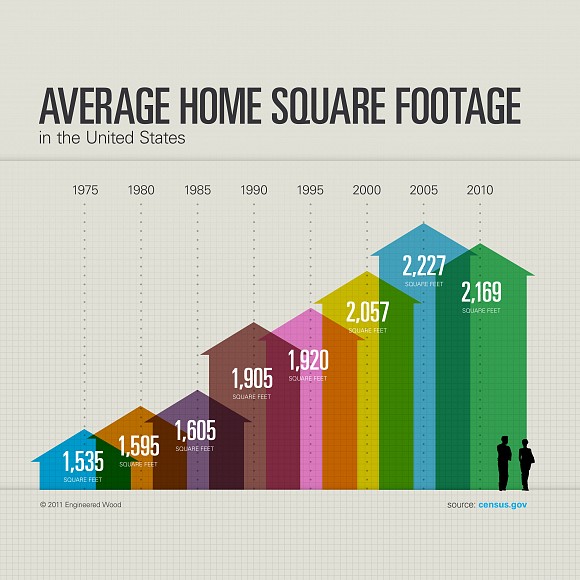Benefits of Smaller Homes
/ For seven days, we've had house guests -- a family of four, including one adorably rambunctious toddler. Suddenly, our quiet household of two adults transformed into a bustling hive of activity.
Given the smaller footprint of our home (about 1,500 square feet), we worried our guests might feel crowded, with the cumulative daily stuff amassed by the six of us slowly taking over.
For seven days, we've had house guests -- a family of four, including one adorably rambunctious toddler. Suddenly, our quiet household of two adults transformed into a bustling hive of activity.
Given the smaller footprint of our home (about 1,500 square feet), we worried our guests might feel crowded, with the cumulative daily stuff amassed by the six of us slowly taking over.
But, to our happy relief, our little house performed marvelously well.
Our guests used the two bedrooms upstairs, while we slept in the added basement bedroom, so each family had its own private space. A big basket in the living room became an impromptu toy box; and with four adults around, someone was always available to keep the dirty dishes and clutter in check. Plus, because it's July, our back porch functioned as a second living room for much of the time.
What surprises me more than how well our home accommodated all of us, is the fact that I worried about it in the first place. Another friend recently described comfortably growing up with a family of four in a 900-square-foot house -- tiny by today's standards! The truth is, families used to be bigger, homes used to be smaller, and for the most part everyone got along just fine.
In 1950, the average U.S. home was 983 square feet. By 2012, that had ballooned to 2,505 square feet (a 154% increase!). Last year, 30% of new homes had 3 or more baths; 41% had four or more bedrooms. Yet the number of people living in U.S. homes shrank by 30% between 1948 and 2012, from an average 3.67 people to 2.55. Do we really need as much space as we seem to think?
There is nothing wrong with owning a larger home. But it's important to question the assumption that a bigger home is always better. Today, a lot people, especially in urban areas and in communities with thriving arts and cultural scenes, are rethinking how much room their families really need and are considering the benefits of smaller homes.
Inspired by revolutionary books like The Not-So-Big House, concerns about the environmental impacts of "McMansions", and the realization that homes in other countries are usually much smaller on average (1,800 square feet in Canada; 1,000 in Japan; 815 in the U.K.), a movement has emerged, singing the praises of small-home living.
The Tumbleweed Tiny House Company, for example, offers portable homes as small as 73 square feet; the popular home-living blog Apartment Therapy hosts the annual Small Cool Contest, for homes ranging from "teeny-tiny" (under 400 square feet) to "small" (800-1,000 square feet). Furniture makers are rolling out smaller-scale designs to meet the needs of small spaces. And, generally speaking, a growing number of us are feeling the urge to live more simply, with less stuff.
When my husband and I were in the market for our first home, we were naturally drawn to smaller homes, many of which were older, with charming architectural details, and in more established neighborhoods. Now that we've lived in our home for a couple of years, we know we made the right choice for us.
Here are some of the benefits of smaller homes:
- They're easier to clean.
- They're cozy -- smaller spaces can be more welcoming than cavernous ones.
- They require less energy to heat and cool (and fewer resources to build) -- which is better for the environment and our budget.
- They inspire us to be deliberate about what we buy -- because there simply isn't room for a lot of "stuff".
- With less space to decorate, we can afford to invest in nicer, more quality furnishings and fixtures.
- It means we can afford to live closer to walkable amenities like cafes, the library, and public green spaces.
- It means we're more likely to spend time on our porch, in our yard, and out in our community.
- It means we make use of every room in our home, almost every day, which tells us we have all the space we really need!
Sometimes, though, smaller homes can begin to feel too small. If you find yourself wishing your home were bigger, here are few questions you might ask...
... Do I actively live in each room, every day? If not, think about ways to better maximize the space you already have -- even if it means repurposing entire rooms. For example, turning a rarely used formal dining room into a playroom or office can suddenly make your home feel larger, because you're using more of the space available.
... Does my furniture fit the scale of my home? Some of us love overstuffed couches, stately credenzas, and farmhouse-style dining tables, but bulky furniture isn't meant for every home. For example, swap our your overstuffed sectional for a smaller, but still-comfy model (like some of these suggestions from Apartment Therapy). And, rethink whether you need certain pieces altogether -- would your living room be more livable without a coffee table in the way? Could your dresser double as a nightstand?
... Can I find creative ways to "add" a new room? Think your smaller house would be perfect, if only it had a fill-in-the-blank? With a little creativity, you can add new spaces without much trouble -- for example, turning a closet into an office, or adding a dining area to a living room.
... Am I battling too much "stuff"? Sometimes the problem isn't the size of the home, but the amount of stuff inside. Research suggests if we simply buy a bigger house, we'll quickly fill up the extra space with even more stuff -- so it's best to deal with the "too much stuff" problem directly. For example, try clearing out your kitchen or your closet of any item you haven't used in the last six months. Most of us would be amazed at how much extra stuff we have. By only keeping what we need and use, our living and storage spaces will feel significantly more spacious. (This applies to kid-related stuff, too -- here are some great suggestions from Grist, about living in small spaces with children.)
My husband and I are already looking forward to hosting another batch of house guests later this summer -- and I have my eye on turning an unused corner of our living room into a proper music space. What about you? If you live in a smaller home, how have you made the most out of your space? How does the size and design of your home support the life you lead? We'd love to hear your stories.


